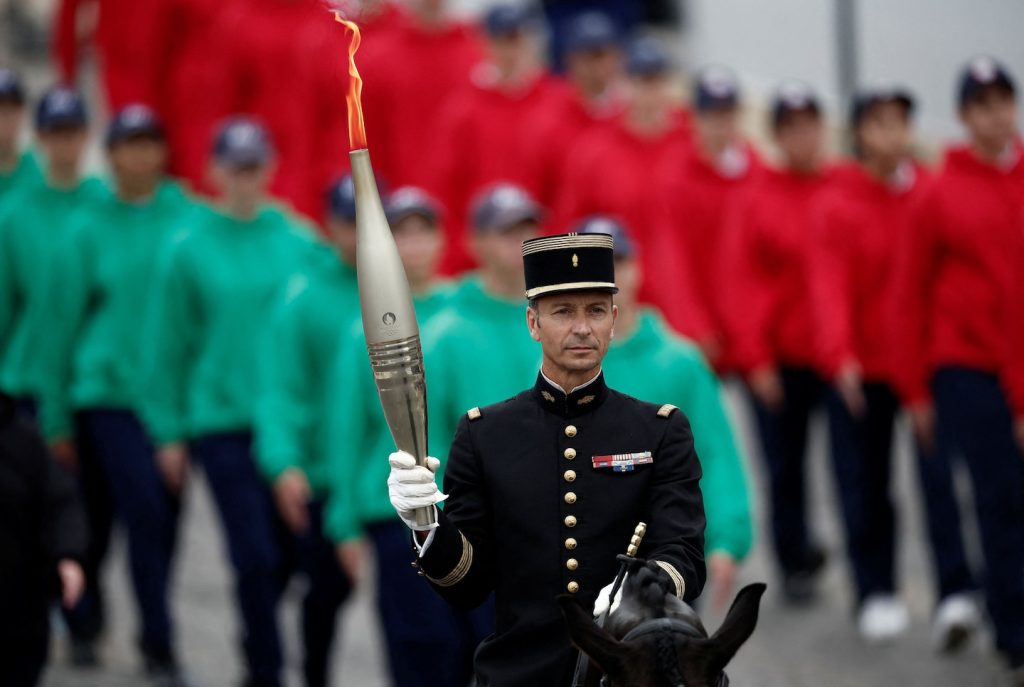The Place de la Concorde, where the Bastille Day procession traditionally ends, has been closed in recent weeks due to construction of a temporary Olympic stadium. As a result, the procession had to be moved to Avenue Foch, one of the shorter and lesser known streets that surround the Arc de Triomphe.
The festival typically draws tens of thousands of people and has easy admission, but this year authorities limited spectators to 6,200 and required advance registration due to space constraints and safety concerns. Olympic Police resources are strained in France, and the number of officers taking part in Sunday’s parade was limited.
Organizers went ahead with the traditional air show, with jets spraying plumes of smoke in the blue, white and red colours of the French flag into cloudy Paris skies.
Displays of tanks and planes are usually the highlight of the annual parade, which also marked 80 years since the country’s liberation from the Nazis on Sunday. But the star of this year’s celebrations was the Olympic torch. Col. Thibaut Valette, a 2016 Olympic equestrian gold medalist, carried the torch through the streets on horseback.
After the parade ended, the torch continued through central Paris, where no tickets were needed to watch the festivities. Marie Nirot, 27, watched the torch pass near the National Assembly, the lower house of parliament. “This is a moment that we share, a moment that brings us together,” she said.
The armored vehicles on display for Bastille Day were set up just feet from a temporary Olympic venue erected at Les Invalides, where young Parisians mingled with tourists at a military recruitment event nearby.
Mixing the arrival of the Olympic torch with a French military parade was “unusual,” Niro acknowledged.
“But we’re keeping the traditions,” she said.
The Olympic flame will travel around the capital and surrounding areas over the next few days before returning to the city centre on July 26 for the opening ceremony on the Seine.
Sunday marks the anniversary of the storming of the Bastille in Paris on July 14, 1789, which marked the beginning of the French Revolution that overthrew the monarchy. The anniversary is celebrated every year with events across France, with a military parade in Paris and fireworks at the Eiffel Tower being the highlights of the day.
President Emmanuel Macron attended the ceremony on Sunday, along with cabinet ministers including Prime Minister Gabriel Attal.
Only a week ago, it seemed possible that President Macron might be forced to share power with a far-right prime minister, but last Sunday’s parliamentary elections in France left the country in political deadlock, with no party or coalition winning a majority in the National Assembly.
Attal, who offered to resign on Monday after the election, was asked by Macron to stay on in the interest of “national stability”.
Macron now faces the possibility of a major drop in his approval rating but is trying to maintain the appearance of business as usual, including attending a NATO summit in Washington last week.
Safety remains a top concern for organizers of this year’s Olympics. Israel-Gaza War France is facing a rise in bomb scares, anti-Semitic incidents and new fears of radicalisation. Tensions with Russia over the war in Ukraine and the related ban on Russian and Belarusian athletes have increased the risk of cyber attacks, French authorities said.
Interior Minister Gerard Darmanin said on Saturday that 3,570 people had died. Excluded The bill was passed banning “dozens of extremists with ties to Islamist, far-left and far-right groups” from participating in the Olympics.
French authorities said earlier this year they aimed to have tested more than one million people by the time the Olympics began, including coaches, athletes, volunteers and participants in events such as Sunday’s military parade. So far, 770,000 people have been tested, Darmanin said Saturday.
Annabel Timsit contributed to this report.


